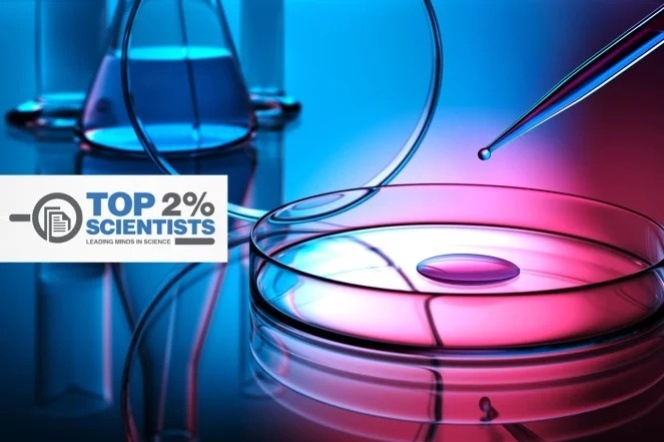Date added: 2025-09-29
Our Researchers Among the Top 2% Most Influential Scientists Worldwide

Researchers from Gdańsk University of Technology have been included in the global ranking of the top 2% most influential scientists worldwide, according to the list compiled by Stanford University in collaboration with Elsevier – with a strong representation from the Faculty of Chemistry.
A total of 56 researchers from Gdańsk University of Technology were included in the latest edition of the prestigious listing entitled "Updated science-wide author databases of standardized citation indicators", prepared by Stanford University in cooperation with Elsevier. The ranking is based on Scopus data (as of August 1, 2025, covering citations through the end of 2024) and comprises the top 2% of the most influential researchers globally.
Among the distinguished individuals are 16 representatives from the Faculty of Chemistry at Gdańsk Tech:
- Prof. Janusz Datta, PhD, DSc, Eng.
- Prof. Kazimierz Darowicki, PhD, DSc, Eng.
- Krzysztof Formela, PhD, Eng., Professor at Gdańsk Tech
- Jacek Gębicki, PhD, DSc, Eng., Professor at Gdańsk Tech
- Prof. Ewa Klugmann-Radziemska, PhD, DSc
- Prof. Piotr Konieczka, PhD, DSc, Eng.
- Prof. Agata Kot-Wasik, PhD, DSc, Eng.
- Prof. Anna Lisowska-Oleksiak, PhD, DSc.
- Patrycja Makoś-Chełstowska, PhD, DSc, Eng., Professor at Gdańsk Tech
- Prof. Jacek Namieśnik, PhD, DSc, Eng.
- Prof. Żaneta Polkowska, PhD, DSc, Eng.
- Justyna Płotka-Wasylka, PhD, DSc, Eng., Professor at Gdańsk Tech
- Prof. Andrzej Składanowski, PhD, DSc, Eng.
- Marek Tobiszewski, PhD, DSc, Eng., Professor at Gdańsk Tech
- Prof. Waldemar Wardencki, PhD, DSc, Eng.
- Prof. Bożena Zabiegała, PhD, DSc, Eng.
Moreover, our researchers have not rested on their laurels — in the supplementary ranking focusing solely on citations from the year 2024 (Top 2% most-cited scientists in the last year), Gdańsk University of Technology is again strongly represented, with 46 names listed, including 15 from the Faculty of Chemistry:
- Prof. Kazimierz Darowicki, PhD, DSc, Eng.
- Prof. Janusz Datta, PhD, DSc, Eng.
- Tomasz Dymerski, PhD, Eng.
- Krzysztof Formela, PhD, Eng., Professor at Gdańsk Tech
- Jacek Gębicki, PhD, DSc, Eng., Professor at Gdańsk Tech
- Prof. Helena Janik, PhD, DSc, Eng.
- Prof. Ewa Klugmann-Radziemska, PhD, DSc
- Prof. Piotr Konieczka, PhD, DSc, Eng.
- Justyna Kucińska-Lipka, PhD, DSc, Eng., Professor at Gdańsk Tech
- Patrycja Makoś-Chełstowska, PhD, DSc, Eng., Professor at Gdańsk Tech
- Mariusz Marć, PhD, DSc, Eng., Professor at Gdańsk Tech
- Prof. Jacek Namieśnik, PhD, DSc, Eng.
- Justyna Płotka-Wasylka, PhD, DSc, Eng., Professor at Gdańsk Tech
- Marek Tobiszewski, PhD, DSc, Eng., Professor at Gdańsk Tech
- Prof. Anna Zielińska-Jurek, PhD, DSc, Eng.
The full list of researchers from Gdańsk University of Technology also includes representatives from other faculties and disciplines, further confirming the university’s broad international scientific recognition.
"I am extremely proud of the achievements of our staff. The Faculty of Chemistry comprises a strong group of scientists who are visible not only in Poland but also internationally. The fact that so many of our researchers have been included in the global ranking of the most cited scientists — and that such a large number appear in the last year citation ranking — is a testament to the high level of research being conducted and its real impact on the advancement of science,"
emphasizes Jacek Gębicki, PhD, DSc, Eng., Dean of the Faculty of Chemistry at Gdańsk Tech.
The ranking prepared by Stanford University and Elsevier is considered one of the most reliable and comprehensive tools for evaluating scientific output worldwide. It is based on standardized citation indicators drawn from the Scopus database. Its goal is to identify researchers whose work has the greatest impact on the advancement of science in their respective fields.
-
2025-11-26
Students scholarship (LoBG)



